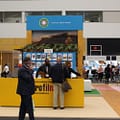LATEST NEWS
Cape Town Ready for Level 3
28 May 2020
Cape Town mayor, Dan Plato, is confident the City’s economic action plan means Cape Town is ready for level 3.
With South Africans in the final week of lockdown level 4, Plato shared what the City was doing to address the COVID-19 pandemic and prepare its health system. This included important work done to support the recovery of the economy in preparation for Level 3.
Public Health Approach
Plato said that as more data became available, the City would be able to rapidly adapt strategies, allowing for more effective ways to identify and prevent the spread of the virus.
“The City of Cape Town has been amplifying the Western Cape government’s approach to targeting hot spots,” he added. “This means that City line departments will be increasing their allocation of resources and services in hot spots to reduce transmission of COVID-19.”
Plato said that since the beginning of March, before the lockdown started, Environmental Health Practitioners (EHPs) had started distributing thousands of pamphlets and posters at shopping malls, supermarkets, food stores, spaza shops and informal food traders to raise awareness about COVID-19.
The City was engaging communities about the importance of proper handwashing, social distancing, cough etiquette, cleaning, sanitising and continual disinfection of frequently touched surfaces. These efforts were ongoing, he said, and were being amplified as the number of cases in the metro increased.
“City Health continues to provide routine primary care services, in a COVID-safe manner, at all its primary care clinics,” added Plato. “This includes ensuring social distancing, hand hygiene and mask-wearing at all facilities, as well as screening all clients attending clinics, and testing when necessary.”
Economic Recovery on Track
Plato explained that the City had put together a plan to get the economy back on track as quickly and safely as possible, in line with the national government’s level 3 lockdown regulations.
He said that many businesses would be allowed to get back to work on 1 June and would have to ensure the relevant safety measures were in place to limit the spread of the coronavirus amongst staff. The national government recommended staggered working hours for businesses, said Plato, calling this a responsible approach to prevent public transport from becoming unnecessarily overcrowded.
“Within the context of the national government’s risk-adjusted approach, “ he added, “the City has already put measures in place to open up the Cape Town’s Film Permit Office. The film industry contributes an estimated R3.5 billion to the economy every year and employs thousands of local Capetonians.”
Plato explained that the current Level 4 lockdown regulations also allowed for civil engineering for public works, such as subsidised housing projects, to resume. This meant that the City had already begun construction projects on some of Cape Town’s key housing developments, within the COVID-19 health and safety regulations.
The tourism industry was another critical part of the economy, he added. “It is estimated that in 2018 the tourism sector created 113 000 jobs and was worth R18.1 billion. Many of the businesses that make this sector the success that it is are in serious financial trouble as a result of the lockdown.” Plato said that many businesses hadn’t been able to apply for financial aid because of the racial criteria instituted by national government.
On Friday, 22 May 2020, Plato declared an intergovernmental dispute with the national Minister of Tourism, Ms Mmamoloko Kubayi-Ngubane, saying the City did not believe that national government was taking the right approach.
Plato stated: “In these unprecedented times and especially since millions of jobs and businesses are on the line, all businesses should qualify for relief funding and discriminatory criteria should not apply in a state of disaster. Now is not the time for race-based policies, now is the time for all of us to work together if we plan to weather this storm.”
The construction sector was a major employer for our communities, he said, explaining that this was why the City had continued to work behind the scenes to ensure that building plans continued to be assessed and approved, so that as soon as the building industry got the go-ahead from national government, they would be ready to start immediately.
“The City has already approved building plans to the value of R2.3 billion since the start of the national lockdown,“ said Plato. He added that many of these plans were for projects that were less than 500m² each and were currently valued at R875 million.
He said that the projects mentioned would enable the many smaller contractors and builders in the city to start construction immediately, once regulations for that sector had been eased.
City’s Budget Adjusted to Address Pandemic
Plato said that the pandemic and consequences of the lockdown had also impacted the City’s annual budget. During the adjustment process, he added, the City had immediately reprioritised R386 million to address new priorities.
Plato continued: “The adjustments budget clearly shows the COVID-19 crisis is not a once-off disruptive event. It will have long-term impacts on the City’s operations and programmes, its income sources for service delivery and on the general socio-economic welfare of its residents and ratepayers.”
He stated that no new funding for the crisis had been made available by the national government. “The City must, therefore, see how it can fund what is required with a reduced budget in a sustainable manner that will not impose substantial rates and tariff shocks to residents and businesses over the medium to longer term,” he said.
Ongoing Food Aid
While food relief remained the direct responsibility of national government, Plato said that through the South African Social Security Agency (SASSA), the City was trying to fill the gaps wherever it could.
To date, City had supported over 80 soup kitchens across the metro with plans for a further 150, he added, saying that the City had chosen the sustainable approach of capacitating soup kitchens within communities as an alternative to only handing out food parcels, because it allowed residents to have at least one meal for the day.
With the City’s assistance, the soup kitchens were able to continue their important work, he said. “The City began this programme with the intention to capacitate feeding schemes in communities who already feed hundreds of people, and to supplement this by donating dry ingredients such as soya mince, lentils, rice, samp and soup mix.”
City Operations
With Level 3 coming into effect on 1 June, said Plato, the City would be able to bring more services online. Plato added: “We are committed to doing this in a safe way for both staff and customers. “We are in the process of devising operational plans so we can get our walk-in centres up and running as soon as possible.”
As the virus spread and infected more of residents, said Plato, the City had seen the impact on its own staff too. As a result of staff testing positive for COVID-19 at a few of its waste-removal depots, transport depots and City health facilities, the City had to temporarily close these facilities while it performed a deep-clean and conducted the very important track and trace to ensure any other persons that were exposed would undergo self-isolation for the appropriate period.”
Plato concluded: “We do everything we can to get these services back up and running as soon as possible, but there will inevitably be a short period of disruption and I call on our residents to please be patient with us in these instances.”







